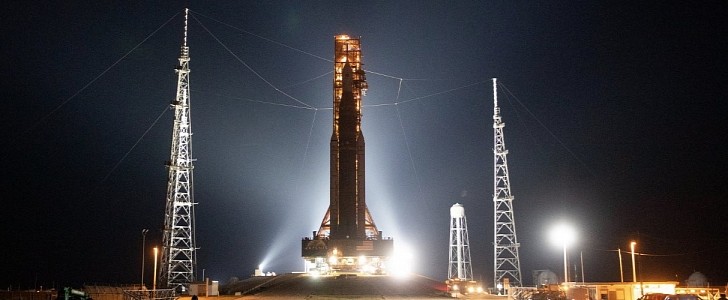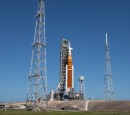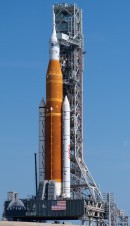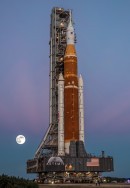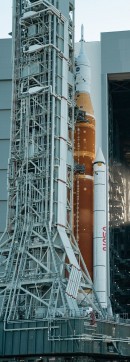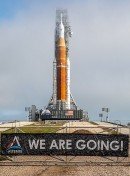After a tense morning, NASA decided to call off today's Artemis I launch attempt due to an issue encountered with one of the Moon rocket's engines. The earliest opportunity to relaunch is on Friday, September 2. Hopefully, in four days' time, we'll be able to see the Space Launch System (SLS) rocket finally take off with the Orion spacecraft on top.
It was a stressful day for NASA. The SLS mega rocket was expected to blast off today (August 29) at 8:33 EDT from the agency's Kennedy Space Center and send the Orion capsule on a six-week journey around the Moon. However, Monday began with a 45-minute delay caused by lightning within about six miles (~10 km) of the launch pad 39B.
Despite the delay, the teams continued with tanking operations and started fueling the SLS rocket's core stage with liquid oxygen and liquid hydrogen. For the first part, everything went accordingly, and NASA seemed to be on track with its plan. But then, the teams detected a hydrogen leak once they moved from the slow fill of liquid hydrogen to fast fill. They managed to resolve the problem quite fast and resumed operations.
Then, the team faced another issue with an engine bleed. The SLS rocket has four RS-25 engines at the bottom, which must be prepared for liftoff. In order to get the engines to the proper temperature for launch, engineers condition them by bleeding liquid hydrogen through them.
Three of the engines seemed to work accordingly. But they noticed that engine no. 3 wasn't bleeding accordingly, so NASA stopped the countdown at T-minus 40 minutes. The teams tried to solve the issue, but as time passed, it became clear that we would not see the rocket leave our skies today.
So the agency decided to scrub off the launch. The next opportunity is on September 2, at 12:48 p.m. EDT. Until then, "teams will continue to gather data" on the engine bleed issue.
The SLS is a complex machine, and every part must function properly before it starts writing history. As NASA Administrator Bill Nelson said in an interview for the agency: "you cannot light the candle until it's ready to go."
Despite the delay, the teams continued with tanking operations and started fueling the SLS rocket's core stage with liquid oxygen and liquid hydrogen. For the first part, everything went accordingly, and NASA seemed to be on track with its plan. But then, the teams detected a hydrogen leak once they moved from the slow fill of liquid hydrogen to fast fill. They managed to resolve the problem quite fast and resumed operations.
Then, the team faced another issue with an engine bleed. The SLS rocket has four RS-25 engines at the bottom, which must be prepared for liftoff. In order to get the engines to the proper temperature for launch, engineers condition them by bleeding liquid hydrogen through them.
Three of the engines seemed to work accordingly. But they noticed that engine no. 3 wasn't bleeding accordingly, so NASA stopped the countdown at T-minus 40 minutes. The teams tried to solve the issue, but as time passed, it became clear that we would not see the rocket leave our skies today.
So the agency decided to scrub off the launch. The next opportunity is on September 2, at 12:48 p.m. EDT. Until then, "teams will continue to gather data" on the engine bleed issue.
The SLS is a complex machine, and every part must function properly before it starts writing history. As NASA Administrator Bill Nelson said in an interview for the agency: "you cannot light the candle until it's ready to go."
The launch of #Artemis I is no longer happening today as teams work through an issue with an engine bleed. Teams will continue to gather data, and we will keep you posted on the timing of the next launch attempt. https://t.co/tQ0lp6Ruhv pic.twitter.com/u6Uiim2mom
— NASA (@NASA) August 29, 2022
